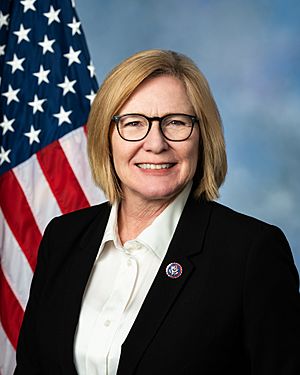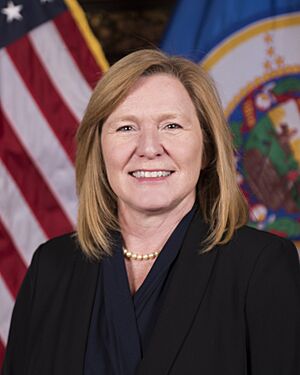Michelle Fischbach facts for kids
Quick facts for kids
Michelle Fischbach
|
|
|---|---|

Official portrait, 2022
|
|
| Member of the U.S. House of Representatives from Minnesota's 7th district |
|
| Assumed office January 3, 2021 |
|
| Preceded by | Collin Peterson |
| 49th Lieutenant Governor of Minnesota | |
| In office January 3, 2018 – January 7, 2019 |
|
| Governor | Mark Dayton |
| Preceded by | Tina Smith |
| Succeeded by | Peggy Flanagan |
| President of the Minnesota Senate | |
| In office January 3, 2017 – May 25, 2018 |
|
| Preceded by | Sandy Pappas |
| Succeeded by | Warren Limmer (acting) |
| In office January 4, 2011 – January 7, 2013 |
|
| Preceded by | Jim Metzen |
| Succeeded by | Sandy Pappas |
| Member of the Minnesota Senate | |
| In office February 12, 1996 – May 25, 2018 |
|
| Preceded by | Joe Bertram |
| Succeeded by | Jeff Howe |
| Constituency | 14th district (1996–2013) 13th district (2013–2018) |
| Personal details | |
| Born |
Michelle Louise Helene St. Martin
November 3, 1965 Woodbury, Minnesota, U.S. |
| Political party | Republican |
| Spouse | Scott Fischbach |
| Children | 2 |
| Education | College of Saint Benedict St. Cloud State University (BA) William Mitchell College of Law (JD) |
| Website | |
Michelle Fischbach (born November 3, 1965) is an American politician and lawyer. Since 2021, she has been a U.S. Representative for Minnesota's 7th congressional district. This district is very large and covers most of western Minnesota.
Michelle Fischbach is a member of the Republican Party. From 2018 to 2019, she served as the 49th Lieutenant Governor of Minnesota. She was the last Republican to hold a statewide office in Minnesota.
Before becoming lieutenant governor, Fischbach was a member of the Minnesota Senate from 1996 to 2018. She was also the president of the Minnesota Senate twice. When Governor Mark Dayton chose Tina Smith to join the U.S. Senate, Michelle Fischbach became lieutenant governor. This happened because the Minnesota Constitution says the Senate president takes over if the lieutenant governor leaves office.
In 2018, Michelle Fischbach ran for lieutenant governor with former Governor Tim Pawlenty. They lost in the primary election. In 2020, Fischbach won against Collin Peterson, who had been the U.S. Representative for 30 years.
Contents
Early Life and Education
Michelle Fischbach grew up in Woodbury, Minnesota. After finishing Woodbury High School, she went to college. She first attended the College of St. Benedict. Later, she transferred to St. Cloud State University. There, she earned a degree in political science and economics in 1989. In 2011, she also earned a law degree from William Mitchell School of Law in Saint Paul.
Her first experience in politics was as an intern for U.S. Senator Rudy Boschwitz. In 1994, Michelle Fischbach made history. She became the first woman elected to the Paynesville City Council. She served on the council until 1996.
Serving in the Minnesota Senate
Michelle Fischbach was first elected to the Minnesota Senate in 1996. This was a special election to fill a seat after the previous senator resigned. She was reelected many times after that.
She held leadership roles in the Senate, serving as an assistant minority leader and a deputy minority leader. She also led the Senate's committee on higher education. In 2011, her fellow senators chose her to be the first female president of the Minnesota Senate. She held this role until 2013. She was elected Senate president again in 2017.
Becoming Lieutenant Governor
How She Became Lieutenant Governor
On December 13, 2017, Governor Mark Dayton appointed his lieutenant governor, Tina Smith, to a U.S. Senate seat. Tina Smith resigned on January 2, 2018. According to the Minnesota Constitution, Michelle Fischbach, as the president of the State Senate, automatically became the lieutenant governor.
A Short Dispute
When she became lieutenant governor, Michelle Fischbach said she wanted to keep her Senate seat too. She called herself "acting lieutenant governor." However, there was a disagreement about whether she could hold both jobs at the same time. Some people said it was allowed based on an old court decision, while others said a newer rule from 1972 meant she could not.
Fischbach said the lieutenant governor's duties were mostly ceremonial, so she could do both jobs. She also chose not to take the lieutenant governor's salary, only keeping her pay as a state senator. The state's attorney general, Lori Swanson, said it was not legal for her to hold both offices.
This situation was important because Republicans had only a one-vote majority in the state Senate. If Fischbach left her Senate seat, it could change who had power in the Senate. In January 2018, someone sued Fischbach to try and make her leave the Senate. However, a judge dismissed the lawsuit. On May 25, 2018, Fischbach resigned from the Senate and officially became the lieutenant governor.
Campaign for Governor
In May 2018, former Republican Governor Tim Pawlenty chose Michelle Fischbach to be his running mate for governor. They ran together in the Republican primary election but lost to Jeff Johnson. Michelle Fischbach left office as lieutenant governor on January 7, 2019.
Serving in the U.S. House of Representatives
Elections
2020 Election
On September 3, 2019, Michelle Fischbach announced she would run for the U.S. House of Representatives. She wanted to challenge Collin Peterson, who had been the representative for Minnesota's 7th congressional district for 30 years. Fischbach won the Republican primary election.
The 7th district had been voting more and more Republican over time. In the 2016 presidential election, Donald Trump won the district with 62% of the vote. This was his best result in Minnesota.
During her campaign, Fischbach promised to support farmers and the Second Amendment (which protects the right to own guns). .....
Fischbach defeated Peterson by a large number of votes in the 2020 election. In the same election, Donald Trump also won the 7th district with 64% of the vote.
Her Work in Congress
On January 7, 2021, Fischbach was one of many representatives who questioned the results of the 2020 U.S. presidential election. On January 13, 2021, she voted against the second effort to remove President Trump from office.
Committees She Serves On
Michelle Fischbach serves on several important committees in the U.S. House of Representatives:
- Committee on Ethics
- Committee on Rules
- She leads the Subcommittee on Legislative and Budget Process.
- Committee on the Budget
- Committee on Ways and Means
- She serves on the Subcommittee on Oversight and the Subcommittee on Trade.
Groups She Belongs To
Fischbach is also a member of several groups in Congress:
- Congressional Western Caucus (she is a vice chair)
- Northern Border Caucus
- Congressional Biofuels Caucus
- Republican Study Committee
Political Views
Michelle Fischbach has voted on several key issues:
- American Rescue Act: She voted against the American Rescue Plan Act of 2021. This act provided financial relief during the COVID-19 pandemic.
- National Defense Act: In 2021, she voted against the National Defense Authorization Act. This bill included a rule that would require women to register for military service.
- Fiscal Responsibility Act: She voted against the Fiscal Responsibility Act of 2023. This bill dealt with government spending and debt.
- Israel: She voted to provide support to Israel after the 2023 Hamas attack.
- Vice President's Office Funding: In November 2023, she voted for a change that would stop funding for the Office of Vice President Kamala Harris.
Personal Life
Michelle Fischbach is Roman Catholic. She met her husband, Scott, while they were working on a political campaign. They moved to Paynesville. When she ran for Congress, she still lived there. She and her family have since moved to Regal, near Willmar. They have two children and several grandchildren.
Her husband, Scott Fischbach, has been the executive director of Minnesota Citizens Concerned for Life since 2001.
Electoral History
2020 Election Results
| Party | Candidate | Votes | % | |
|---|---|---|---|---|
| Republican | Michelle Fischbach | 26,359 | 58.8 | |
| Republican | Dave Hughes | 9,948 | 22.2 | |
| Republican | Noel Collis | 6,747 | 15.1 | |
| Republican | William Louwagie | 989 | 2.2 | |
| Republican | Jayesun Sherman | 757 | 1.7 | |
| Total votes | 44,800 | 100.0 | ||
| Party | Candidate | Votes | % | |
|---|---|---|---|---|
| Republican | Michelle Fischbach | 188,994 | 53.8 | |
| Democratic (DFL) | Collin Peterson (incumbent) | 139,071 | 39.6 | |
| Total votes | 351,227 | 100.0 | ||
| Republican gain from Democratic (DFL) | ||||
2022 Election Results
| Party | Candidate | Votes | % | |
|---|---|---|---|---|
| Republican | Michelle Fischbach (incumbent) | 204,766 | 66.9 | |
| Democratic (DFL) | Jill Abahsain | 84,455 | 27.6 | |
| Legal ... Now Party | Travis Johnson | 16,421 | 5.4 | |
| Write-in | 224 | 0.1 | ||
| Total votes | 305,866 | 100.0 | ||
| Republican hold | ||||
2024 Election Results
| Party | Candidate | Votes | % | |
|---|---|---|---|---|
| Republican | Michelle Fischbach (incumbent) | 275,098 | 70.5 | |
| Democratic (DFL) | John Peters | 114,979 | 29.4 | |
| Write-in | 433 | 0.1 | ||
| Total votes | 390,510 | 100.0 | ||
| Republican hold | ||||
See Also
- List of female lieutenant governors in the United States
- Women in the United States House of Representatives
 | Kyle Baker |
 | Joseph Yoakum |
 | Laura Wheeler Waring |
 | Henry Ossawa Tanner |


